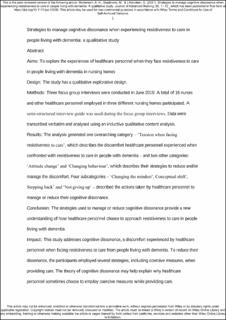| dc.description.abstract | Aims: To explore the experiences of healthcare personnel when they face resistiveness to care in people living with dementia in nursing homes Design: The study has a qualitative explorative design. Methods: Three focus group interviews were conducted in June 2019. A total of 16 nurses and other healthcare personnel employed in three different nursing homes participated. A semi‐structured interview guide was used during the focus group interviews. Data were transcribed verbatim and analysed using an inductive qualitative content analysis. Results: The analysis generated one overarching category – ‘Tension when facing resistiveness to care’, which describes the discomfort healthcare personnel experienced when confronted with resistiveness to care in people with dementia – and two other categories: ‘Attitude change’ and ‘Changing behaviour’, which describes their strategies to reduce and/or manage the discomfort. Four subcategories – ‘Changing the mindset’, Conceptual shift’, Stepping back’ and ‘Not giving up’ – described the actions taken by healthcare personnel to manage or reduce their cognitive dissonance. Conclusion: The strategies used to manage or reduce cognitive dissonance provide a new understanding of how healthcare personnel choose to approach resistiveness to care in people living with dementia. Impact: This study addresses cognitive dissonance, a discomfort experienced by healthcare personnel when facing resistiveness to care from people living with dementia. To reduce their dissonance, the participants employed several strategies, including coercive measures, when providing care. The theory of cognitive dissonance may help explain why healthcare personnel sometimes choose to employ coercive measures while providing care. | en_US |
